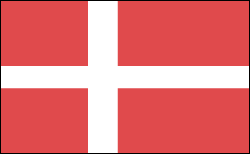
Kingdom of Denmark
National name: Kongeriget Danmark
Sovereign: Queen Margrethe II (1972)
Prime Minister: Anders Fogh Rasmussen (2001)
Land area: 16,359 sq mi (42,370 sq km); total area: 16,639 sq mi (43,094 sq km)1
Population (2007 est.): 5,468,120 (growth rate: 0.3%); birth rate: 10.9/1000; infant mortality rate: 4.5/1000; life expectancy: 78.0; density per sq mi: 334
Capital and largest city (2003 est.): Copenhagen, 1,094,400
Other large cities: Århus, 220,700; Odense, 144,600; Ålborg, 120,600
Monetary unit: Krone
Languages: Danish, Faroese, Greenlandic (Inuit dialect), German; English is the predominant second language
Ethnicity/race: Scandinavian, Inuit, Faroese, German, Turkish, Iranian, Somali
Religions: Evangelical Lutheran 95%, other Protestant and Roman Catholic 3%, Muslim 2%
Literacy rate: 100%
Economic summary: GDP/PPP (2005 est.): $181.6 billion; per capita $33,400. Real growth rate: 2.8%. Inflation: 1.9%. Unemployment: 5.5%. Arable land: 54%. Agriculture: barley, wheat, potatoes, sugar beets; pork, dairy products; fish. Labor force: 2.9 million; agriculture 3%, industry 21%, services 76% (2004 est.). Industries: iron, steel, nonferrous metals, chemicals, food processing, machinery and transportation equipment, textiles and clothing, electronics, construction, furniture and other wood products, shipbuilding and refurbishment, windmills, pharmaceuticals, medical equipment. Natural resources: petroleum, natural gas, fish, salt, limestone, stone, gravel and sand. Exports: $84.95 billion f.o.b. (2005 est.): machinery and instruments, meat and meat products, dairy products, fish, chemicals, furniture, ships, windmills. Imports: $74.69 billion f.o.b. (2005 est.): machinery and equipment, raw materials and semimanufactures for industry, chemicals, grain and foodstuffs, consumer goods. Major trading partners: Germany, Sweden, UK, U.S., Netherlands, Norway, France, Italy, China (2004).
Communications: Telephones: main lines in use: 3,610,100 (2003); mobile cellular: 4,785,300 (2003). Radio broadcast stations: AM 2, FM 355, shortwave 0 (1998). Television broadcast stations: 26 (plus 51 repeaters) (1998). Internet hosts: 1,219,925 (2004). Internet users: 2.756 million (2002).
Transportation: Railways: total: 2,628 km (2004). Highways: total: 71,847 km; paved: 71,847 km (including 918 km of expressways); unpaved: 0 km (2002). Waterways: 417 km (2001). Ports and harbors: Aalborg, Aarhus, Asnaesvaerkets, Copenhagen, Elsinore, Ensted, Esbjerg, Fredericia, Frederikshavn, Graasten, Kalundborg, Odense, Roenne. Airports: 97 (2004 est.).
International disputes: Iceland disputes the Faroe Islands' fisheries median line; Iceland, the UK, and Ireland dispute Denmark's claim that the Faroe Islands' continental shelf extends beyond 200 nm; Faroese continue to study proposals for full independence; uncontested sovereignty dispute with Canada over Hans Island in the Kennedy Channel between Ellesmere Island and Greenland.
Geography
Smallest of the Scandinavian countries (half the size of Maine), Denmark occupies the Jutland peninsula, a lowland area. The country also consists of several islands in the Baltic Sea; the two largest are Sjælland, the site of Copenhagen, and Fyn.
Government
Constitutional monarchy.
History
From 10,000 to 1500 B.C., the population of present-day Denmark evolved from a society of hunters and fishers into one of farmers. Called Jutland by the end of the 8th century, its mariners were among the Vikings, or Norsemen, who raided western Europe and the British Isles from the 9th to 11th century.
The country was Christianized by Saint Ansgar and Harald Blaatand (Bluetooth)—the first Christian king—in the 10th century. Harald's son, Sweyn, conquered England in 1013. Sweyn's son, Canute the Great, who reigned from 1014 to 1035, united Denmark, England, and Norway under his rule; the southern tip of Sweden was part of Denmark until the 17th century. On Canute's death, civil war tore apart the country until Waldemar I (1157–1182) reestablished Danish hegemony over the north.
In 1282, the nobles won the Great Charter, and Eric V was forced to share power with parliament and a Council of Nobles. Waldemar IV (1340–1375) restored Danish power, checked only by the Hanseatic League of north German cities allied with ports from Holland to Poland. Denmark, Norway, and Sweden united under the rule of his daughter Margrethe in 1397. But Sweden later achieved autonomy and in 1523, under Gustavus I, independence.
Denmark supported Napoléon, for which it was punished at the Congress of Vienna in 1815 by the loss of Norway to Sweden. In 1864, the Prussians under Bismarck and the Austrians made war on Denmark as an initial step in the unification of Germany. Denmark was neutral in World War I.
In 1940, Denmark was invaded by the Nazis. King Christian X reluctantly cautioned his fellow Danes to accept the occupation, but there was widespread resistance against the Nazis. Denmark was the only occupied country in World War II to save all its Jews from extermination, by smuggling them out of the country.
Beginning in 1944, Denmark's relationship with its territories changed substantially. In that year, Iceland declared its independence from Denmark, ending a union that had existed since 1380. In 1948, the Faroe Islands, which had also belonged to Denmark since 1380, were granted home rule, and in 1953, Greenland officially became a territory of Denmark.
In 2001, the dominant Social-Democrat Party lost to Anders Fogh Rasmussen of the center-right Liberal Party, which formed a coalition with the Conservative Party. Prime Minister Fogh Rasmussen, author of From Socialist to Minimalist State, is a strong proponent of privatization, deregulation, and limited government. Immigration to Denmark fell dramatically in 2002, after Fogh Rasmussen instituted Europe's most restrictive laws for asylum seekers. Because of Denmark's social welfare benefits, the country had become a much-sought-after haven for refugees. In Feb. 2005, Fogh Rasmussen won a second term as prime minister.
In Feb. 2006, the publication of political cartoons depicting the Islamic prophet Muhammad set off a series of outraged demonstrations and riots in a number of Muslim countries. At least a dozen died in the protests.
Fogh Rasmussen was arrowly elected to a third term in early elections in November 2007. His narrow win forced him to broaden his coalition government to include the recently formed pro-immigration party, New Alliance.
Hiç yorum yok:
Yorum Gönder